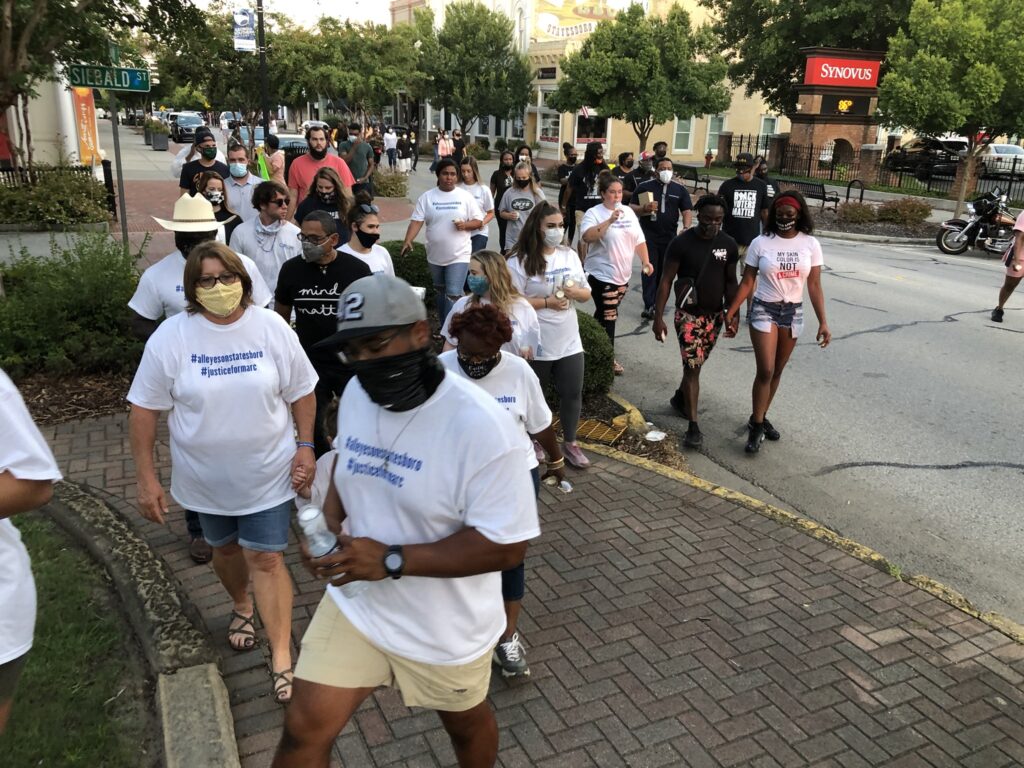
THE SERAAJ REPORT, by Kevin Seraaj
In the early morning of June 14, 2020, William “Marc” Wilson was driving his Ford Fusion down a highway near Statesboro, Georgia, accompanied by his girlfriend, Emma Rigdon. Wison is bi-racial. To the uninformed, that means he’s black. Rigdon, however, is white. A group of white teens in a pickup truck saw the two of them together and began yelling racial slurs. They swerved their truck at his car, seemingly in an attempt to force him off the road.
At the time of this confrontation, America was besieged by protests over the killing of George Floyd by police in Minneapolis. In Georgia, just a few months before, Ahmaud Arbery had been chased down by a group of white men in a pickup truck who yelled racial slurs before shooting and killing him. Racial tensions were high. Whites unhappy with black protest were launching their own personal counter-protests, and the anti-Black voices were becoming louder and more strident. Wilson had every reason to fear for his life– and for the life of his passenger, Emma Rigdon. The judge thought so, too.
Under Georgia law, “A person who uses threats or force relating to the use of force in defense of self, others, habitation, or other property has no duty to retreat and has the right to stand his or her ground and use force, including deadly force.” Wilson and Rigdon both said they were in fear for their lives.
According to Rigdon, Wilson rolled down his window and told the boys to “chill.” When they tried again to run them off the road, she said Wilson fired a warning shot from his lawfully possessed handgun hoping to stop the aggression. It didn’t. When they tried again to run the Ford Fusion off the road, she said Wilson fired his weapon a second time, apparently killing one of the boys.
Given the climate in the country, Wilson was justified in feeling that he and Rigdon, now not surprisingly his ex-girlfriend, could end up being beaten or killed by the young good old boys. But when you don’t wear blue and carry a badge and gun, you don’t get to use the magical “in fear of my life” phrase unless someone is actually shooting at you. Especially if you’re black.
When a white man in Turlock, California, Robin Duane Boyer, tried to use the stand your ground defense in his shooting of another white man he found outside his home, prosecutors declined to allow the defense, proving that white men don’t always get the benefit of the doubt. Still, they are far more likely than non-whites to successfully use “stand your ground” according to a March 2021 report titled, “Stand Your Ground Laws Increase Gun Violence and Perpetuate Racial Disparities,” authored by the Coalition to Stop Gun Violence.
When a white man is denied the right to use “stand your ground,” it’s almost guaranteed the person shot was aso white. In Boyer’s case the white man he shot was not only white, but Boyer shot him in the back– meaning Boyer was not being threatened at the time. So, occasionally the system will overlook SYG and punish a white man for killing another white man. For a black man, though, to have any hope of using the defense, the person he shoots cannot be white. There is a long and sordid history of things not going well in America for black men who kill whites.
And Wison shot a white man in the south.
In his case, Boyer was sentenced to only 7 years in prison, while Wilson was sentenced to ten– the maximum under Georgia law for manslaughter.

According to Rigdon, Wilson “saved her life that night.” She testified that although she never heard the racial slurs, she saw the boys throwing beer cans and other items at them. She said she believed both of them would have been killed by the boys in the pickup truck had Wilson not fired his gun.
As noted above, Superior Court Judge Ronald K. Thompson said he believed that Wilson was really in fear, but that he “made a bad decision.”
It’s hard to reconcile the judge’s words: you can be in fear for your life, but if you’re black, you can’t do anything about it.
Even if we accept the notion that actually shooting at the pickup truck was a “bad decision,” if the judge thought Wilson was in fear for his life, he had the discretion to sentence him under the state’s first offender act, which would have led to a more lenient sentence and removed the offense from the 23-year-old’s record after serving his time.
The truth, if Thompson was honest, is that “stand your ground” laws are not equitably applied. A paper published by the Urban Institute verifies this. It found that homicides are 65 percent more likely to be justified in states with stand your ground laws when the defendant is White.
“When the shooter is black and the victim is white, the shooting is ruled justified in [only] about 1 percent of cases, . . . Between 2005 and 2010, there were 1,210 homicides with a black shooter and a white victim—the shooting was ruled to be justified in just 17 of them (about 1 percent).”
Prosecutors also chose not to charge the other white teenagers with attempting to run Wilson and Rigdon off the road.
In America, some things never change. Go figure.
